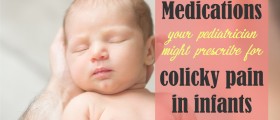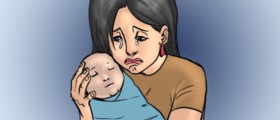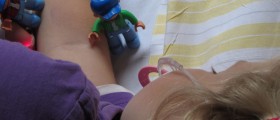
Laryngomalacia
Laryngomalacia is a medical condition in which laryngeal tissue becomes soft and this results in the entrance of the affected part of the larynx into the airway during inhalation respiratory phase. Laryngeal tissues are not strong enough to support the pressure brought by breathing. This condition mostly occurs in infants and is noticeable right after the birth. The cause of laryngomalacia has not been identified yet. Some believe that incomplete development of laryngeal muscles may be a cause of laryngomalacia.
Parents may notice problems with breathing a few weeks after the child's birth. An infant may produce abnormal sound while breathing. This sound occurs when the infant inhales. It may resemble rattling or crowning and in some cases may be rather intensive and horrifying. Problems even more intensify if the baby is lying on its back. Basically, the only problem is related to the unpleasant sound which is caused by the condition. Still, in some children the disease can be rather severe and even lead to serious difficulties with breathing.
Symptoms of Laryngomalacia
The symptoms become visible a few days after the birth. Occasional noisy breathing is the leading symptoms of this disease. In severe cases the infant may have difficulties with swallowing. If the baby has trouble with breathing, it will cry hoarsely and be chronically excited.
In mild cases the disease may lead to symptoms after a year of birth. In these children symptoms tend to intensify.
Treatment for Laryngomalacia
In majority of cases of laryngomalacia the symptoms withdraw spontaneously and the treatment is not necessary. If the baby gains weight and develops normally and if the symptoms are mild, maturation of the larynx will eventually stop the unpleasant noise. The condition withdraws spontaneously within two years and in some patients it takes longer for all the symptoms to disappear. The symptoms may re-appear during respiratory infections or strenuous physical activity.
Simple maneuvers may reduce the intensity of symptoms. The child should be sleeping on the side rather than on the back. The head of the baby needs to be a little elevated and the symptoms will drastically decrease. These maneuvers are performed until the larynx becomes strong enough to endure the pressure caused by breathing.
In some cases of laryngomalacia babies may suffer from acid reflux and they are given medications which prevent damage caused by stomach acid. Medications may as well reduce the production of stomach acid or even increase tonicity of the esophagus not allowing stomach acid to enter airways. In extreme cases when child's breathing is significantly affected doctors perform tracheotomy.

















Your thoughts on this
Loading...